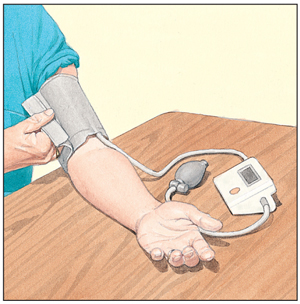Checking Your Own Blood Pressure

Blood pressure checks are a common reason for visits to your healthcare provider. Yet, for less than the cost of a single appointment, you may be able to purchase your own blood pressure monitor. This way you can check the reading yourself at home.
Blood pressure is the force of blood against the walls of your arteries. Blood pressure readings tend to vary, depending on many factors, including stress levels and time of day. Your blood pressure reading in a healthcare provider's office can be as much as 20 or 30 points higher. The nervousness of being there can be enough to increase blood pressure.
Home blood pressure kits
You may buy blood pressure monitors at a variety of stores, including pharmacies, medical supply stores, general merchandise stores, and even online retailers. An electronic digital monitor that is battery operated is often easier to use than the more traditional blood pressure cuff. Electronic monitors usually cost more.
It’s important to check the accuracy of either type of monitor every so often. One way to make sure your monitor is accurate is to take it with you to your next healthcare provider appointment. Take your blood pressure with your monitor and compare it with the reading from your healthcare provider's monitor.
Ask your healthcare provider or pharmacist to recommend a monitor for you. Keep in mind that if you have a large upper arm, you'll need a special, large cuff to get a correct reading.
Ask your healthcare provider when and how often you should take your blood pressure at home.
Read the instructions
Each type of blood pressure monitor works differently. Be sure to read the instructions that come with yours. Ask your healthcare provider, nurse, or pharmacist to teach you how to use it. Many people can check their own blood pressure at home without difficulty. Some need help from a family member or friend.
Your home blood pressure reading is more likely to be accurate if you do the following:
-
Don't take readings within a half-hour after smoking, exercising, eating, or drinking beverages, especially with caffeine.
-
Take at least 2 readings 1 or 2 minutes apart.
-
Take your blood pressure at the same time every day.
-
Before you take your blood pressure, sit for 5 minutes with your back supported and your feet flat on the ground. Don't cross your legs. Rest your arm on a table at the level of your heart.
-
Use the bathroom before taking your reading. A full bladder can change the results.
-
Don't talk while your blood pressure is being measured.
Blood pressure measurements are given as two numbers. Systolic blood pressure is the upper number. This is the pressure when the heart contracts. Diastolic blood pressure is the lower number. This is the pressure when the heart relaxes between beats. Both numbers in a blood pressure reading are important. As we grow older, systolic blood pressure is particularly important.
Blood pressure is categorized as low, normal, elevated, or stage 1 or stage 2 high blood pressure:
-
Low blood pressure is systolic of less than 90 and diastolic of less than 60.
-
Normal blood pressure is systolic of less than 120 and diastolic of less than 80.
-
Elevated blood pressure is systolic of 120 to 129 and diastolic less than 80.
-
Stage 1 high blood pressure is systolic of 130 to 139 or diastolic is between 80 to 89.
-
Stage 2 high blood pressure is systolic of 140 or higher or diastolic is 90 or higher.
Get medical care right away if your blood pressure is much higher or lower than expected. Whenever you visit your healthcare provider, take your blood pressure record with you.
As a monitor ages, it may become less accurate. If the equipment or monitor you have is older than 5 years, you may need a new monitor. Take your monitor with you to your healthcare appointments and check the accuracy of the monitor against the reading the healthcare providers are getting.